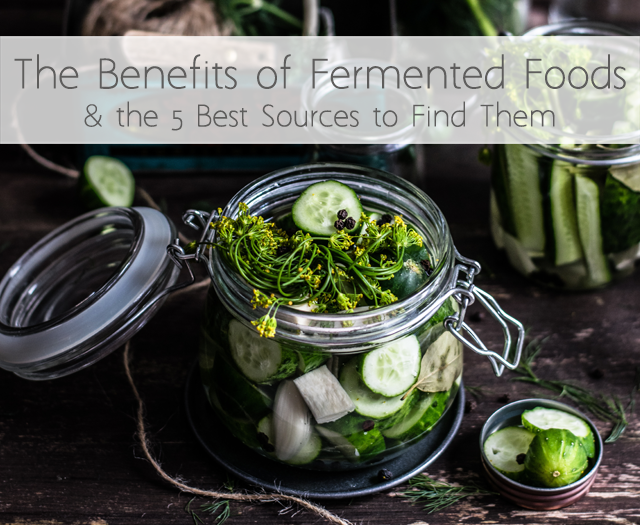Today on the blog we are talking about the benefits of fermented foods. Now I have always stressed the importance of a healthy gut and liver to my patients. One of the most popular questions they ask me is, “Is there a good supplement for this?” My answer? The best source is from real food, and one of the best sources of natural probiotics is fermented foods. So today I will break down the benefits of fermented foods and the top five best foods to add to your diet.
What is Fermentation?
Fermentation is the process many of our favorite foods go through. It is something that has been practice for a very long time and it helps maintain the freshness of many foods and beverages. Some fermented foods are: coffee, wine, beer, sauerkraut, bread, cheese and yogurt. These foods are good for you because they are the most natural way to get a healthy dose of probiotic bacteria. This is the healthy bacteria that your body desperately needs. There are many benefits to fermented foods, and they support your body in many ways but the most important ones are: overall digestive function and health, boosts the immune system, supports cognitive function, kills yeast infections, strengthens your bones, and fights allergies.
Top 5 Fermented Foods
1. Kombucha
Super trendy right now, but the power of kombucha won’t come and go with the fads and trends. It is a fermented beverage made of sugar (from fruit or honey) and black tea. It has a high amount of yeast that react with the sugar and start the fermentation process that changes the chemical structure of the beverage.
2. Sauerkraut
This is one of the most traditional sources of probiotics you can have. It is made from cabbage that is high in fiber, vitamin A, C, K, and B. It also contains a high source of magnesium, iron, copper and calcium. Be aware, traditional store-bought sauerkraut isn’t always fermented, so be sure to check the label to make sure you are getting the purest and most healthy form.
3. Pickles
One of the benefits to fermented foods is that they are easy to add to your diet, but you must always check the labels. For instance, fermented pickles contain a high amount of vitamins, minerals, and gut-friendly probiotic bacteria. However many pickles are loaded with sugar and they are made with cucumbers and vinegar. The fermentation process of cucumbers requires water and salt.
What do you look for on the label? Look for “lactic acid fermented pickles”. Check the ingredients and see if they are made with brine (salt and water), and that they have been fermented. Buying these local will be your best option for the highest quality of probiotics, but having the knowledge of what to look for will help you to make the best decision. You can also make your own pickles at home!
4. Yogurt
Yogurt is the most consumed probiotic dairy food in America. It strengthens your immune system, it is high in vitamins, protein and minerals, promotes healthy weight management and it supports the overall health of the gut. The yogurt is big and slightly overwhelming, so some key ingredients to check are the following:
- Check the sugar content – yogurt is a common place that sugar can hide. Avoid flavors. You can add sweeteners at home.
- Organic
- Made from milk that is grass fed – goat, cow or sheep’s milk
5. Raw Cheese
Don’t let the word “raw” scare you. Raw cheese is filled with all of the benefits of fermented foods. Raw dairy products have not been pasteurized, therefore the pasteurization (heating) process has not removed all of the amino acids, fatty acids, natural probiotics, and vitamins and minerals that are present. These might be harder to find in your local supermarket, but check the label. It should clearly say “Raw” or “Unpasteurized”. Your local farmer’s market or farm will be a great place to find raw cheese.


Good introductory article. Mike Adams recently discovered that Claussen and others are adding sodium benzoate to their pickle brine as a preservative. This is highly toxic.
I have been making my own fermented veggies for years and never get sick. I buy fresh broccoli, cauliflower, chard, beets, onions, kale, collard greens and spinach. Grind everything in a food processor. Mix it in a large container. then scoop it into ~10 quart size yogurt containers and compress it. Leave ~1″ space on top.
Then make your brine by juicing a whole stalk of fresh organic celery and a few carrots. Add a little minced garlic (optional). Then add 1 teaspoon of Dr. Mercola’s Kinetic Culture powder. This probiotic will 10x the K1 content of your fermented veggies. Mix it well, then add equal amount into each container and seal. Set them aside for 4 days. The tops will start bulging within 12 hours as fermentation occurs. Burp them occasionally and wipe up any juice that overflows. After 96+ hours, refrigerate the containers to stop the fermentation process. They will keep for a couple months.
One thing I do, to improve the taste, is add 3-4 teaspoons of sauerkraut to a container when I start using it. Push it down along the sides until it’s fully mixed. I eat 2-3 heaping teaspoons every day – either with my eggs or salad. Enjoy!
Thank you, Bill Sanders, for the additional fermented foods ideas. The benefits are substantial!